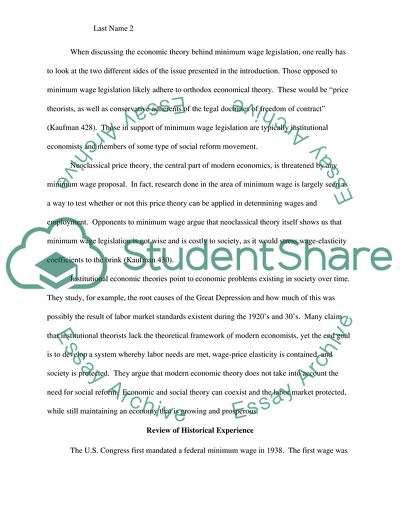
- Home
- Free Samples
- Premium Essays
- Editing Services
- Extra Tools
- Essay Writing Help
- About Us
- Studentshare
- Subjects
- Miscellaneous
- I don't have a topic (Intermediate Microeconomics)
I don't have a topic (Intermediate Microeconomics) - Essay Example

- Subject: Miscellaneous
- Type: Essay
- Level: Undergraduate
- Pages: 4 (1000 words)
- Downloads: 0
- Author: nitzscheward
Extract of sample "I don't have a topic (Intermediate Microeconomics)"
Opponents of such a policy, however, point out that for such a wage to be high enough that it is effective, it will actually increase unemployment. This would be particularly true, they claim, for workers that are inexperienced or handicapped. Such a minimum wage policy, then, actually harms these less skilled workers and can keep them out of the labor altogether (Black 300). Congress, listening to both sides, has long struggled with the issue of federal minimum wage legislation and has been hesitant to make drastic changes.
What follows is a brief about this issued, followed by recommended policy actions. When discussing the economic theory behind minimum wage legislation, one really has to look at the two different sides of the issue presented in the introduction. Those opposed to minimum wage legislation likely adhere to orthodox economical theory. These would be “price theorists, as well as conservative adherents of the legal doctrines of freedom of contract” (Kaufman 428). Those in support of minimum wage legislation are typically institutional economists and members of some type of social reform movement.
Neoclassical price theory, the central part of modern economics, is threatened by any minimum wage proposal. In fact, research done in the area of minimum wage is largely seen as a way to test whether or not this price theory can be applied in determining wages and employment. Opponents to minimum wage argue that neoclassical theory itself shows us that minimum wage legislation is not wise and is costly to society, as it would stress wage-elasticity coefficients to the brink (Kaufman 430). Institutional economic theories point to economic problems existing in society over time.
They study, for example, the root causes of the Great Depression and how much of this was possibly the result of labor market standards existent during the 1920’s and 30’s. Many claim that institutional theorists lack the theoretical framework of
...Download file to see next pages Read MoreCHECK THESE SAMPLES OF I don't have a topic (Intermediate Microeconomics)
INTERMEDIATE MACROECONOMICS
Profit, Oligopolies and Cartels
Long-Term Financial Options
Mathematics as a Discipline Has a Very Important Place
Business Environment and Investment Climate
Current Issues in Management and Financial Accounting
Problems and Solutions of Macroeconomics
An analysis of literature relating to illegitimate work and it's contribution to the labour market

- TERMS & CONDITIONS
- PRIVACY POLICY
- COOKIES POLICY